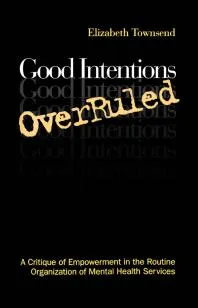Good Intentions OverRuled : A Critique of Empowerment in the Routine Organization of Mental Health Services
4.0
Reviews from our users

You Can Ask your questions from this book's AI after Login
Each download or ask from book AI costs 2 points. To earn more free points, please visit the Points Guide Page and complete some valuable actions.Introduction
Transforming mental health care has long been a conversation centered around empowerment—the idea of giving individuals more control and autonomy over their treatment. However, in practice, implementing these ideals often leads to unintended consequences. Good Intentions OverRuled: A Critique of Empowerment in the Routine Organization of Mental Health Services takes a critical and thought-provoking look at how the concept of empowerment, while noble in theory, falters in the routinized operations of mental health services.
Drawing on a combination of qualitative research, real-world case studies, and a multidisciplinary analysis of mental health care systems, this book explores the gaps between policy ideals and their implementation. It highlights the complexities of creating patient-centered care while navigating issues of bureaucracy, institutional habits, and structural inequities.
At its core, this book scrutinizes how “good intentions” are often constrained or even undermined by the rigid frameworks within which they operate. The result is a text that challenges mental health professionals, policymakers, and advocates to think critically about how empowerment is defined, implemented, and experienced by those it is meant to serve.
Detailed Summary
The core argument of Good Intentions OverRuled revolves around how empowerment initiatives in mental health services are compromised when they enter the realm of routine organizational processes. Rather than achieving their stated goals of restoring autonomy and dignity to service users, these programs often reinforce existing power dynamics.
The book delves deep into the concept of “organizational inertia," a phenomenon where institutions prioritize operational efficiency over innovation or reform. Despite mental health policies promoting patient-led care, the real-world implementation often becomes mired in standardized procedures, case management systems, and risk-averse practices. These elements, although logistically necessary, dilute the essence of empowerment.
Through poignant case studies, the book reveals how service users often feel disempowered or even invisible within these systems. Their voices, while nominally heard through forums and feedback processes, are rarely integrated into decision-making in substantive ways. The narrative also highlights how service providers struggle to align their professional values of empathy and advocacy with the constraints of institutional demands, leading to burnout and ethical dilemmas.
The book is divided into three main sections:
- The Historical and Policy Context: Examines the origins of the empowerment discourse in mental health care and how it evolved into a policy imperative.
- Challenges in Implementation: Analyzes the barriers to enacting empowerment in routine practice, including bureaucratic inefficiencies and stakeholder conflicts.
- Toward Meaningful Empowerment: Proposes actionable solutions to bridge the gap between ideals and practices, emphasizing the need for co-production, accountability, and structural reform.
Key Takeaways
This book offers profound insights into the challenges and opportunities within the mental health sector. Key takeaways include:
- Empowerment initiatives often fail because they lack mechanisms for genuine power-sharing between service users and providers.
- Organizational routines, intended to streamline care, can alienate patients and stifle innovation.
- Service providers face significant moral and professional tensions when institutional priorities clash with patient-focused care.
- Transformative change requires not only policy reform but also a paradigm shift in how institutions perceive and value patient agency.
Famous Quotes from the Book
Here are some impactful excerpts that capture the essence of the book:
"Empowerment begins as a rallying cry for autonomy and dignity, but too often it ends as another checkbox in a bureaucratic system."
"Systems designed to care often fall prey to their own efficiencies, losing sight of the individuals they are meant to serve."
"True empowerment is not about speaking for the voiceless but creating spaces where voices cannot be ignored."
Why This Book Matters
Mental health care is at a crossroads, with growing recognition of the need for more humane, inclusive, and responsive systems. Good Intentions OverRuled is a seminal text that challenges readers to rethink foundational assumptions about how care is delivered and experienced. It encourages a more honest evaluation of systemic barriers to empowerment and urges stakeholders to prioritize authentic collaboration with service users.
Whether you are a mental health professional, policymaker, educator, or advocate, this book provides critical tools for understanding the limitations of current practices and envisioning a more equitable future. It reminds us that real empowerment is not a destination but a continuous, collaborative process that demands vigilance, humility, and courage.
Free Direct Download
You Can Download this book after Login
Accessing books through legal platforms and public libraries not only supports the rights of authors and publishers but also contributes to the sustainability of reading culture. Before downloading, please take a moment to consider these options.
Find this book on other platforms:
WorldCat helps you find books in libraries worldwide.
See ratings, reviews, and discussions on Goodreads.
Find and buy rare or used books on AbeBooks.
1191
بازدید4.0
امتیاز50
نظر98%
رضایتReviews:
4.0
Based on 0 users review
"کیفیت چاپ عالی بود، خیلی راضیام"


